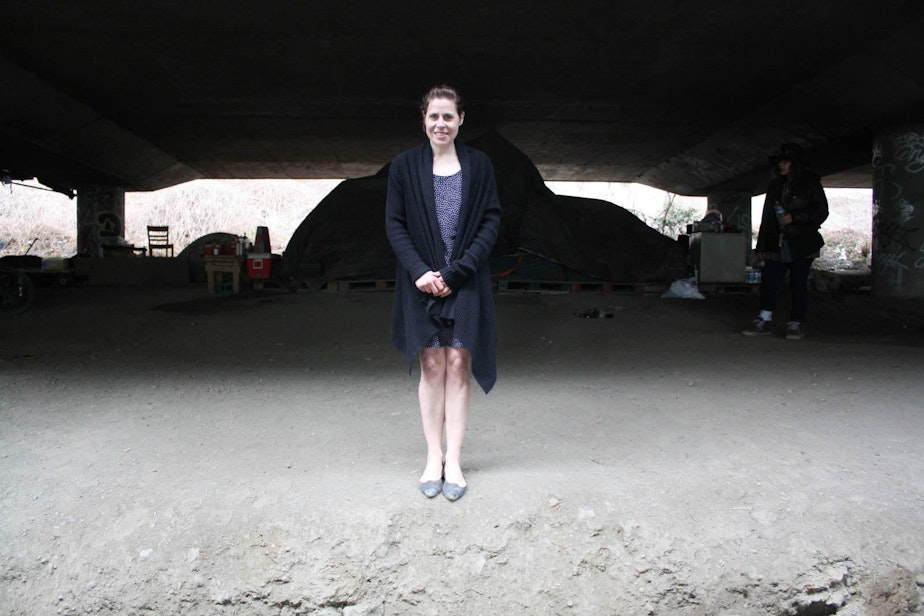4 things to know about Mayor Ed Murray's homeless levy

This summer, Seattle voters will likely be tasked with a big decision. Should the city should double what it spends combating homelessness?
The levy, backed by Seattle Mayor Ed Murray, would pour $275 million into programs fighting homelessness over a five-year period and would be paid for by increasing property taxes. The tax increase would cost homeowners 27 cents for every thousand dollars of assessed value.
But first, the Yes on I-126 campaign has to gather the 30,000 signatures before April 5 to qualify for the August 1 ballot.
Harley Lever of Safe Seattle and Daniel Malone of the Downtown Emergency Service Center joined KUOW’s Bill Radke to debate the proposal.
Lever argued against the levy, saying the city needs to do a better job of allocating the funding that’s already in place. He pointed to Boston, Houston and Salt Lake City as examples of cities that do a good job appropriating funds to organizations that are doing effective work — and said those cities have greatly reduced homelessness.
“Right now, Seattle has 128 providers running 354 distinct programs,” Lever said. “This is a very difficult bureaucracy to manage. And because of this, we have a lack of uniform data capture. We are not measuring the outcomes of our strategies, and it leaves us with a tremendous bill.”
But Malone, who helped draft the I-126 proposal, said he’s not buying that. He said Seattle is dealing with a historic housing crunch, unlike Boston, Houston and Salt Lake City — and that lack of low-income housing is the real problem.
“This measure is about creating more housing opportunities for people to get them off the streets, and that’s exactly what we need to be doing,” Malone said.
Here are four things to know about the proposed levy — and what Malone and Lever had to say about them.
Most of the levy’s funds — about $185 million — are earmarked for housing assistance, including short- and long-term rent subsidies.
Seattle recently conducted a homeless needs assessment survey, and rental assistance and affordable housing were the top responses to the question: “What would help you obtain permanent housing?” Ninety percent of those surveyed said they’d move into safe and affordable housing if it were available.
Lever favors a “Rapid Rehousing” solution to homelessness, which provides housing vouchers to help people avoid becoming homeless or to re-house those who are living on the streets or in shelters. But he said the city needs to improve relationships with landlords to make that program successful.
“We’ve created such an environment that most of the landlords are either saying, I don’t want to work with the city or they’re selling their units and moving elsewhere,” Lever said.
Malone, who supports the mayor’s levy, said programs like Rapid Rehousing won’t solve pricey housing.
“These are disabled folks,” he said. “These are people who are living on fixed income … They’re going to have to have long-term subsidized housing to be able to make it.”
Lever said the city needs to do a better job of spending the funds it already has: “We’re just taking the wrong approach over and over.”
Malone said he agrees that current homeless solutions can be improved — but doesn’t believe that alone will solve Seattle’s homeless issues. He argued that the real problem is that Seattle is growing quickly and rents are rising: “We just don’t have enough for everybody here.”
The levy proposal also seems to agree that more oversight would be needed to ensure new tax revenue from the levy was being spent effectively, and outlines plans to create a review board to evaluate which sponsored programs are most effective.
A consultant hired by the city to examine its homeless crisis had some harsh words about Seattle’s three authorized tent cities. Barbara Poppe, a nationally-renowned expert on homeless solutions, told the Seattle Times that the city isn’t solving anything by supporting homeless encampments.
“Encampments are a real distraction from investing in solutions,” Poppe told the Times. “You can see it takes a lot of energy to get them running, and they don’t solve the problem. You still have people who are visibly homeless, living outdoors.”
Malone said there are two types of homeless encampments: those authorized by the city, and those that spring up naturally — and he said most of the garbage-strewn camps around the city fall into the last category.
“When we house people, we are not going to have people living in squalor like that,” Malone said. “People don’t want to live in situations like that. People want to live inside.”
But Lever rebutted that it’s not lack of funding that’s keeping people in encampments: “We have a broken system, and they want to add $275 million to a broken system.”
Radke asked Malone and Lever about a longstanding concern that more assistance will mean more people looking for a handout. “There’s this idea that if Seattle is too generous with people — this ‘Freeattle’ idea,” Radke said.
Malone said he believes that’s unfounded. “I don’t buy it, that it’s a real phenomenon that is truly contributing to the depth of the crisis here,” he said.
He added: “Shouldn’t we all be frustrated and — dare I say, ashamed — that this is going on in our community? That we allow ourselves, in this time of prosperity, to have that kind of destitution among us all?”
Lever said people should look for a solution by doing a better job of gathering and using data: “I am absolutely compassionate, but in the same breath I’m also a data-driven, evidence based guy,” he said.

